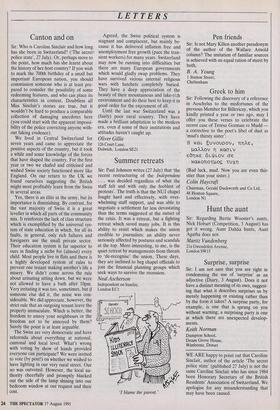LETTERS Canton and on
Sir: Who is Caroline Sinclair and how long has she been in Switzerland? (The secret! police state', 27 July). Or, perhaps more to the point, how much has she learnt about the history of her host country? If you wish to mark the 700th birthday of a small but important European nation, you should commission someone who is at least pre- pared to consider the possibility of some redeeming features, and who can place its characteristics in context. Doubtless all Miss Sinclair's stories are true, but it wouldn't be hard to produce a comparable collection of damaging anecdotes here (you could start with the apparent impossi- bility of the police convicting anyone with- out faking evidence).
We lived in Central Switzerland for seven years and came to appreciate the positive aspects of the country, but it took a while and some knowledge of the forces that have shaped the country. For the first year or two we chafed and criticised and wished Swiss society functioned more like England. On our return to the UK we found ourselves suggesting the British might most profitably learn from the Swiss in several areas.
Yes, there is an elite in the army, but its importance is diminishing. By contrast, for the vast majority of Swiss it is a great leveller in which all parts of the community mix. It reinforces the lack of class structure which is exemplified by the universal sys- tem of state education in which, for all its faults, in general, only rich failures and foreigners use the small private sector. Their education system is far superior to ours in finding a niche for (almost) every child. Most people live in flats and there is a highly developed system of rules to prevent one tenant making another's life a misery. We didn't come across the rule about urinating sitting down, but we were not allowed to have a bath after lOpm. Very irritating it was too, sometimes, but if someone else did it, the noise was con- siderable. We did appreciate, however, the strict rule that an outgoing tenant leave the property immaculate. Which is better, the freedom to annoy your neighbours or the freedom not to be annoyed by them? Surely the point is at least arguable.
The Swiss are very democratic and have referenda about everything at national, cantonal and local level. What's wrong with voting by show of hands provided everyone can participate? We were invited to vote (by post!) on whether we wished to have lighting in our very rural street. Our no was outvoted. However, the local au- thority cheerfully and promptly blacked out the side of the lamp shining into our bedroom window at our request and their • cost. Agreed, the Swiss political system is stagnant and complacent, but mainly be- cause it has delivered inflation free and unemployment free growth (pace the tran- sient workers) for many years. Switzerland may now be running into difficulties but there are many European governments which would gladly swap problems. They have survived vicious internal religious wars with hatchets completely buried. They have a deep appreciation of the beauty of their mountainous and lake-rich environment and do their best to keep it in good order for the enjoyment of all.
Until the last war Switzerland was a (fairly) poor rural country. They have made a brilliant adaptation to the modern era, even if some of their institutions and attitudes haven't caught up.
Oliver Gillie
126 Court Lane, Dulwich, London SE21


















































 Previous page
Previous page